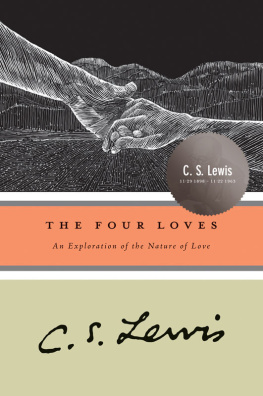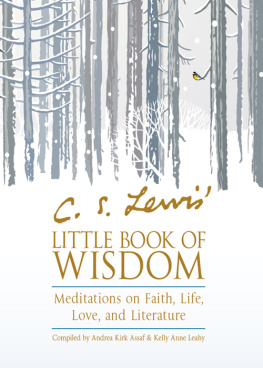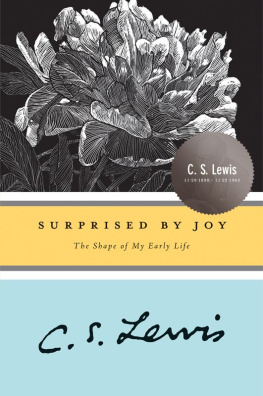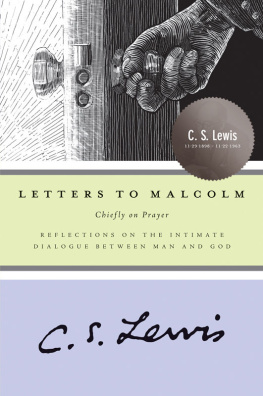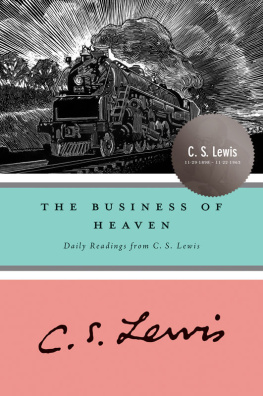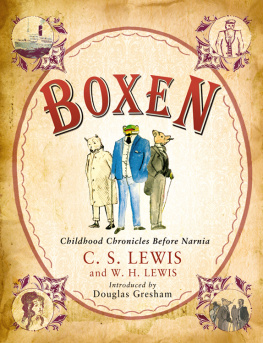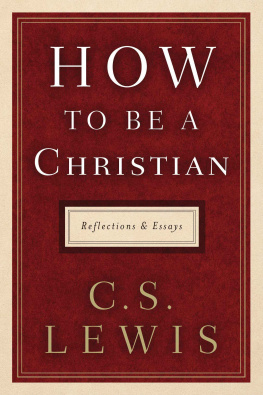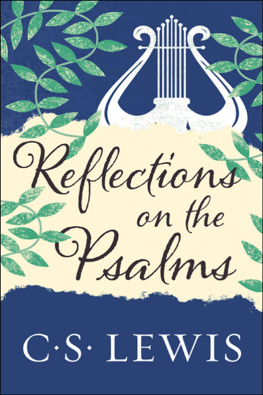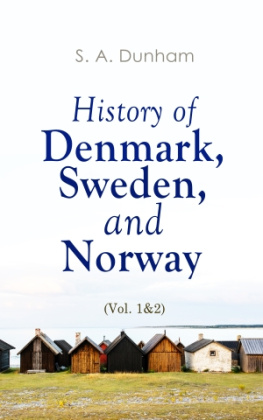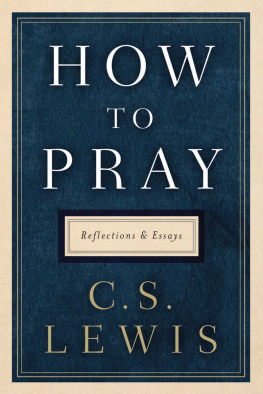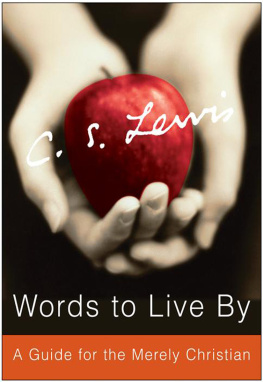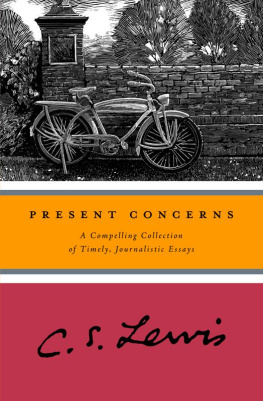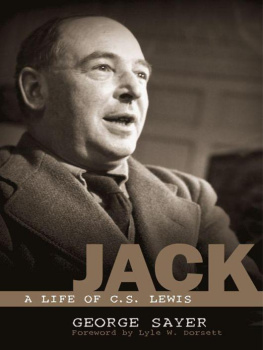
Table of Contents
First Mariner Books edition 2012
Copyright 1960, renewed 1988 by C. S. Lewis PTE Limited
For information about permission to reproduce selections from this book, write to Permissions, Houghton Mifflin Harcourt Publishing Company, 215 Park Avenue South, New York, New York 10003.
www.hmhco.com
The Library of Congress has cataloged the print edition as follows:
Lewis, C. S. (Clive Staples), 18981963.
The four loves/C. S. Lewis,
p. cm.
Reprint. Originally published: New York: Harcourt, Brace, 1960.
ISBN 0-15-132916-8
ISBN 0-15-632930-1 (Harvest: pbk.)
ISBN 978-0-15-632930-9 (Harvest: pbk.)
1. LoveReligious aspectsChristianity. I. Title.
BV4639.L45 1991
241'.4dc20 91-4033
e ISBN 978-0-547-53969-0
v5.0315
To Chad Walsh
Introduction
God is love, says St. John. When I first tried to write this book I thought that his maxim would provide me with a very plain highroad through the whole subject. I thought I should be able to say that human loves deserved to be called loves at all just in so far as they resembled that Love which is God. The first distinction I made was therefore between what I called Gift-love and Need-love. The typical example of Gift-love would be that love which moves a man to work and plan and save for the future well-being of his family which he will die without sharing or seeing; of the second, that which sends a lonely or frightened child to its mothers arms.
There was no doubt which was more like Love Himself. Divine Love is Gift-love. The Father gives all He is and has to the Son. The Son gives Himself back to the Father, and gives Himself to the world, and for the world to the Father, and thus gives the world (in Himself) back to the Father too.
And what, on the other hand, can be less like anything we believe of Gods life than Need-love? He lacks nothing, but our Need-love, as Plato saw, is the son of Poverty. It is the accurate reflection in consciousness of our actual nature. We are born helpless. As soon as we are fully conscious we discover loneliness. We need others physically, emotionally, intellectually; we need them if we are to know anything, even ourselves.
I was looking forward to writing some fairly easy panegyrics on the first sort of love and disparagements of the second. And much of what I was going to say still seems to me to be true. I still think that if all we mean by our love is a craving to be loved, we are in a very deplorable state. But I would not now say (with my master, MacDonald) that if we mean only this craving we are mistaking for love something that is not love at all. I cannot now deny the name love to Need-love. Every time I have tried to think the thing out along those lines I have ended in puzzles and contradictions. The reality is more complicated than I supposed.
First of all, we do violence to most languages, including our own, if we do not call Need-love love. Of course language is not an infallible guide, but it contains, with all its defects, a good deal of stored insight and experience. If you begin by flouting it, it has a way of avenging itself later on. We had better not follow Humpty Dumpty in making words mean whatever we please.
Secondly, we must be cautious about calling Need-love mere selfishness. Mere is always a dangerous word. No doubt Need-love, like all our impulses, can be selfishly indulged. A tyrannous and gluttonous demand for affection can be a horrible thing. But in ordinary life no one calls a child selfish because it turns for comfort to its mother; nor an adult who turns to his fellow for company. Those, whether children or adults, who do so least are not usually the most selfless. Where Need-love is felt there may be reasons for denying or totally mortifying it; but not to feel it is in general the mark of the cold egoist. Since we do in reality need one another (it is not good for man to be alone), then the failure of this need to appear as Need-love in consciousnessin other words, the illusory feeling that it is good for us to be aloneis a bad spiritual symptom; just as lack of appetite is a bad medical symptom because men do really need food.
But thirdly, we come to something far more important. Every Christian would agree that a mans spiritual health is exactly proportional to his love for God. But mans love for God, from the very nature of the case, must always be very largely, and must often be entirely, a Need-love. This is obvious when we implore forgiveness for our sins or support in our tribulations. But in the long run it is perhaps even more apparent in our growingfor it ought to be growingawareness that our whole being by its very nature is one vast need; incomplete, preparatory, empty yet cluttered, crying out for Him who can untie things that are now knotted together and tie up things that are still dangling loose. I do not say that man can never bring to God anything at all but sheer Need-love. Exalted souls may tell us of a reach beyond that. But they would also, I think, be the first to tell us that those heights would cease to be true Graces, would become Neo-Platonic or finally diabolical illusions, the moment a man dared to think that he could live on them and henceforth drop out the element of need. The highest, says the Imitation, does not stand without the lowest. It would be a bold and silly creature that came before its Creator with the boast Im no beggar. I love you disinterestedly. Those who come nearest to a Gift-love for God will next moment, even at the very same moment, be beating their breasts with the publican and laying their indigence before the only real Giver. And God will have it so. He addresses our Need-love: Come unto me all ye that travail and are heavy-laden, or, in the Old Testament, Open your mouth wide and I will fill it.
Thus one Need-love, the greatest of all, either coincides with or at least makes a main ingredient in mans highest, healthiest, and most realistic spiritual condition. A very strange corollary follows. Man approaches God most nearly when he is in one sense least like God. For what can be more unlike than fullness and need, sovereignty and humility, righteousness and penitence, limitless power and a cry for help? This paradox staggered me when I first ran into it; it also wrecked all my previous attempts to write about love. When we face it, something like this seems to result.
We must distinguish two things which might both possibly be called nearness to God. One is likeness to God. God has impressed some sort of likeness to Himself, I suppose, in all that He has made. Space and time, in their own fashion, mirror His greatness; all life, His fecundity; animal life, His activity. Man has a more important likeness than these by being rational. Angels, we believe, have likenesses which Man lacks: immortality and intuitive knowledge. In that way all men, whether good or bad, all angels including those that fell, are more like God than the animals are. Their natures are in this sense nearer to the Divine Nature. But, secondly, there is what we may call nearness of approach. If this is what we mean, the states in which a man is nearest to God are those in which he is most surely and swiftly approaching his final union with God, vision of God and enjoyment of God. And as soon as we distinguish nearness-by-likeness and nearness-of-approach, we see that they do not necessarily coincide. They may or may not.
Perhaps an analogy may help. Let us suppose that we are doing a mountain walk to the village which is our home. At mid-day we come to the top of a cliff where we are, in space, very near it because it is just below us. We could drop a stone into it. But as we are no cragsmen we cant get down. We must go a long way round; five miles, maybe. At many points during that
Next page
